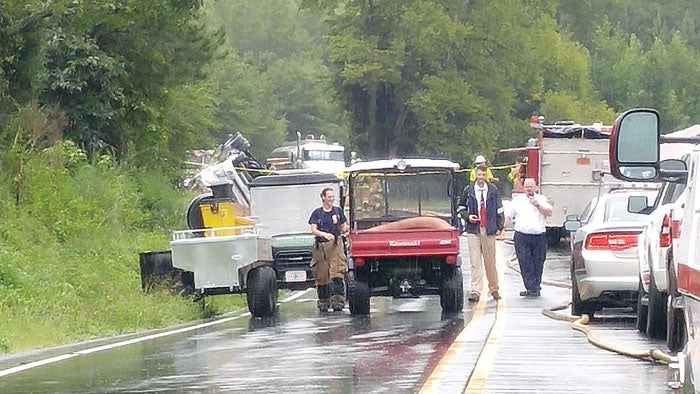Elizabeth Cook: Bringle Ferry not fit for tankers?
Published 12:22 am Sunday, August 13, 2017

- Emergency crews respond to a tanker that overturned one August morning on Bringle Ferry Road, not far from Big Buck Road. The tanker was carrying 8,000 gallons of ethanol, spilling an estimated 3,000 to 4,000 gallons onto the road. The ethanol was contained and the remaining liquid inside the truck was pumped into an empty tanker. Shavonne Walker/Salisbury Post
Should tankers hauling thousands of gallons of ethanol be allowed to travel Bringle Ferry Road?
People who live along this eastern Rowan County road are asking that question after one tanker overturned there with disastrous results in 2015, and another crashed about two miles away last Tuesday.
Meanwhile, on the very same day as that second crash, another tanker wrecked on N.C. 49 in Cabarrus County. It was a bad day for traffic tie-ups.
But what about Bringle Ferry Road?
The short answer is that, by law, the tankers and their drivers have every right to use Bringle Ferry Road, according to J.P. Couch, division traffic engineer for the N.C. Department of Transportation.
“A truck is a truck,” Couch said. “… Everyone is allowed on our roads.” Public roadways are paid for with tax dollars and are open to all.
That said, there are similarities in these incidents that the Department of Transportation should linvestigate. Tanker accidents endanger the drivers, the environment, local residents and their homes.
Several factors may be at play — tanker design, driver training, road dimensions.
Narrow shoulders on the sides of the road may be the most direct hazard. If a heavy tanker for some reason runs off the pavement to the right, there’s not much room to recover.
Couch says the state doesn’t have enough right-of-way to widen the shoulders, and acquiring that access would be costly.
All three tankers were carrying ethanol from a distribution terminal in Denton that expanded several years ago. According to Frank Thomason, director of Emergency Services in Rowan County, the terminal is about a mile over the Rowan-Davidson line.
“The fuel comes into the distribution terminal by rail and it is then bulk loaded on the tanker trucks for distribution,” Thomason said. “Apparently Bringle Ferry Road is used as a semi-direct route to I-85.”
No wonder people living on that road believe they see more than their share of tankers.
The 2015 accident was by far the worst. Driver James Richard Sechler, 62, lost his life after safely piloting tanker trucks for 37 years, according to his obituary. He had been a stalwart in the South Rowan Boosters Club and taught Sunday school at Mt. Zion Baptist Church in China Grove.
No one knows for sure why Sechler’s tanker ran off the road on April 2, 2015. Investigating Trooper J.G. Leonard said there was no braking prior to impact.
A Post reader who saw a photo of the accident online pointed out the 3- or 4-inch drop-off from the then-newly paved road to the shoulder. That’s a dangerous drop for a truck hauling 8,000 gallons of ethanol.
The overturned tanker spilled thousands of gallons into a creek and the ground in the front of a home at 11510 Bringle Ferry Road, near Panther Creek Road. The cleanup dragged on and on, and the emergency evacuation of nearby homes developed into a permanent one when three evacuees finally moved away. One of them is now suing the transport, trucking and cleanup companies.
Brad Beachy says he and his wife have thought about moving out of their Bringle Ferry Road home in Richfield because of the heavy tanker traffic.
“Every morning I walk for exercise on Bringle Ferry Road and watch these tankers speeding,” Beachy wrote to the Post. “Every morning I wave my hands at them to slow them down.”
The trucks slowed for awhile after the earlier accident, but Beachy said he recently followed a tanker truck that was going 70 mph.
The Highway Patrol didn’t cite speed as a factor in the accidents, but the situation feels dangerous to the people of Bringle Ferry.
The driver in Tuesday’s accident on Bringle Ferry — David Milton Griggs, 63, of Clemmons — ran his tanker off the road to the right in a slight curve, according to Trooper C.J. Doty. “The weight of it just sent him on over,” Doty said.
Griggs suffered a broken collarbone, bruises and cuts, according to the trooper. Not as much ethanol spilled as did in the 2015 accident, and Thomason said the environmental damage was minimal.
Both Griggs and the driver in the Cabarrus accident were charged with failure to maintain lanes.
Those lanes and their shoulders need to be wider if tanker trucks are to continue to use Bringle Ferry Road as a thoroughfare. Drivers are paid to stay on the pavement, but mistakes happen, and road shoulders should enhance safety rather than increase risk — especially when drivers are hauling potentially hazardous material by the tankload.
Elizabeth Cook is editor of the Salisbury Post.

